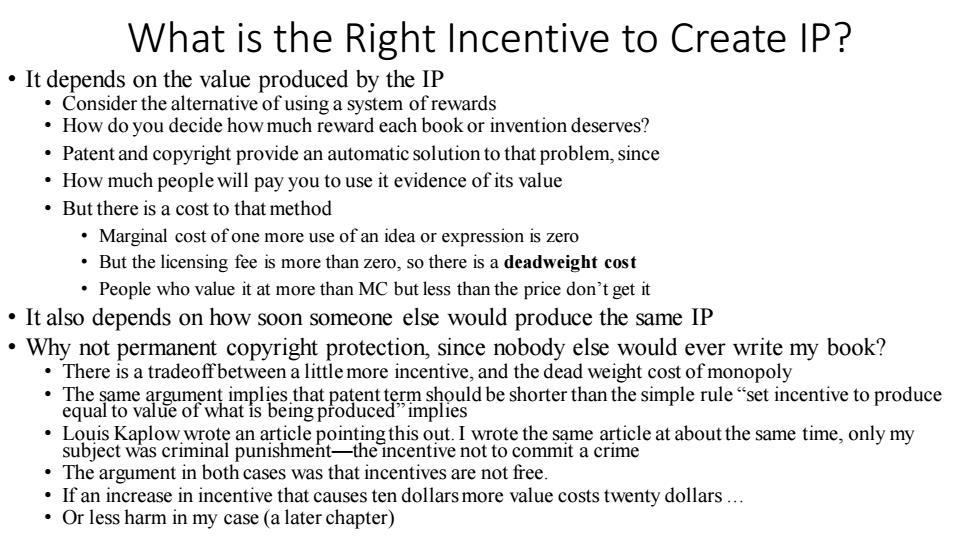正在加载图片...

What is the Right Incentive to Create IP? It depends on the value produced by the IP Consider the alternative of using a system of rewards How do you decide how much reward each book or invention deserves? Patent and copyright provide an automatic solution to that problem,since How much people will pay you to use it evidence of its value But there is a cost to that method Marginal cost of one more use of an idea or expression is zero But the licensing fee is more than zero,so there is a deadweight cost People who value it at more than MC but less than the price don't get it It also depends on how soon someone else would produce the same IP Why not permanent copyright protection,since nobody else would ever write my book? There is a tradeoffbetween a little more incentive,and the dead weight cost of monopoly The same argument implies that patent term should be shorter than the simple rule"set incentive to produce equal to value of what is being produced"implies Louis Kaplow wrote an article pointing this out.I wrote the same article at about the same time,only my subject was criminal punishment-the incentive not to commit a crime The argument in both cases was that incentives are not free. If an increase in incentive that causes ten dollars more value costs twenty dollars... Or less harm in my case (a later chapter) What is the Right Incentive to Create IP? • It depends on the value produced by the IP • Consider the alternative of using a system of rewards • How do you decide how much reward each book or invention deserves? • Patent and copyright provide an automatic solution to that problem, since • How much people will pay you to use it evidence of its value • But there is a cost to that method • Marginal cost of one more use of an idea or expression is zero • But the licensing fee is more than zero, so there is a deadweight cost • People who value it at more than MC but less than the price don’t get it • It also depends on how soon someone else would produce the same IP • Why not permanent copyright protection, since nobody else would ever write my book? • There is a tradeoff between a little more incentive, and the dead weight cost of monopoly • The same argument implies that patent term should be shorter than the simple rule “set incentive to produce equal to value of what is being produced” implies • Louis Kaplow wrote an article pointing this out. I wrote the same article at about the same time, only my subject was criminal punishment—the incentive not to commit a crime • The argument in both cases was that incentives are not free. • If an increase in incentive that causes ten dollars more value costs twenty dollars … • Or less harm in my case (a later chapter)